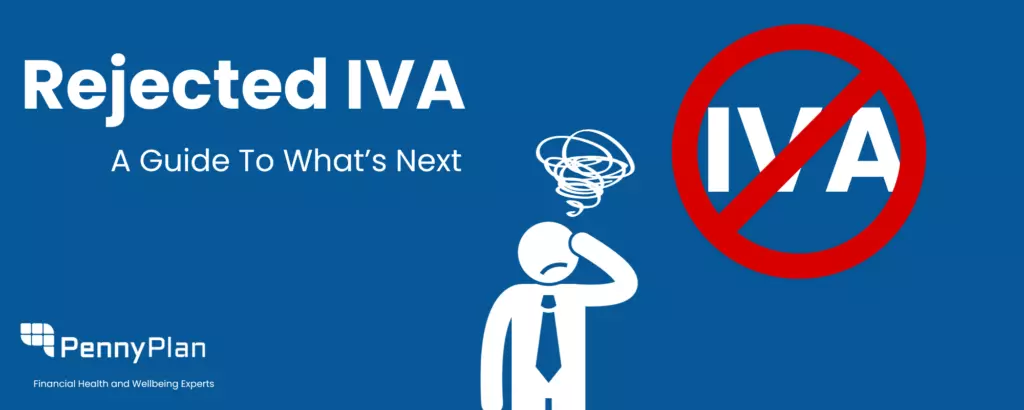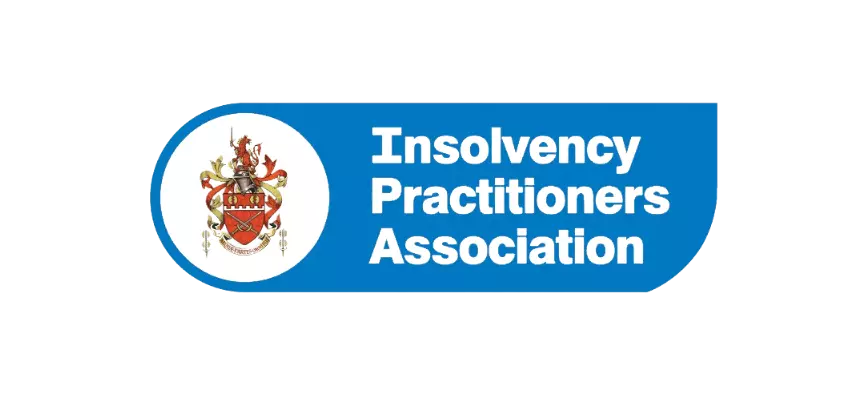When facing mounting unsecured debts, many people consider an Individual Voluntary Arrangement (IVA) as a means to regain control of their financial situation.
An IVA provides a structured repayment plan over set period of time, while offering protection against legal actions from creditors. It even gives you potential debt write off.
However, for an IVA to be put into action it requires approval from the majority of the creditors involved.
But what happens if your IVA is rejected by creditors?
In this post we’ll discuss why your IVA could have been rejected and discuss your next steps.
From re-proposing your IVA proposal, to the other debt solutions available to you. We’ll give you all the information you need to make a well-informed decision.
Understanding the IVA Approval Process
Before discussing creditor refusal of your IVA, it’s important to understand the IVA approval process.
An IVA isn’t just a decision made by the person with the debt owed, it’s a joint agreement. A negotiation that requires acceptance by a large percentage of the creditors.
By understanding the process, debtors can be better prepared for what a creditor would expect.
This helps you avoid potential setbacks, ensuring the highest possibility of securing an agreement that works for all parties involved.
Basics of an IVA Proposal
The foundation of an IVA lies in its proposal.
This document crafted by your insolvency practitioner (IP), who acts as the intermediary between you and your creditors.
It outlines your commitment to paying back a percentage of the total debt, usually over five to six years.
The proposal is carefully tailored to your unique financial situation and details monthly repayments, percentage of the debt to be repaid, and the duration of the IVA.
This is then sent for creditor approval, and they are given a set period of time to respond with their verdict.
The Significance of Creditor Majority in IVA Votes
The IVA approval does not rely on all creditors accepting your proposal.
Instead, the proposal becomes binding if approved by creditors representing 75% in value of those who vote.
This means that even if some creditors reject the proposal, it can still proceed if the majority by value is in favour.
For some, this can be amazing to hear when faced with creditor contact from smaller debts who are openly informing you of their intention to reject.
As long as the other larger creditors voting in acceptance reaches the threshold, the input of the smaller rejections would not be important.
Timeline for the Creditor Response
Once an Individual Voluntary Arrangement (IVA) proposal is submitted, the wheels are in motion for creditors to review and respond.
Upon receiving the IVA proposal, creditors are given a specified timeframe to assess its details and respond.
Typically creditors have 14 days to convene a meeting, where they deliberate on the proposal terms.
This gathering is known as the ‘meeting of creditors‘.
If they fail to respond within this window, then their voting input is not considered.
During this period, it is normal for debtors to feel anxiety waiting for an outcome that could solidify the next steps in resolving their debts.
Potential Outcomes When Creditors Decline an IVA
Rejection of your IVA proposal by creditors can evoke a mixed bag of emotions, from sheer disappointment, to anxiety and depression.
However, a declined proposal doesn’t always mean an IVA is no longer viable.
Instead, it signals the beginning of revising the initial proposal or exploring alternate debt solutions.
The Role of an Insolvency Practitioner in Overcoming Rejections
At the centre of every IVA proposal and its acceptance lies the Insolvency Practitioner (IP).
This is where an experienced Insolvency Practitioner comes to the forefront.
Their role is not only to draft and propose the IVA, but also to try and overcome any rejections or concerns raised by creditors.
IPs can offer a balanced perspective, ensuring that the your interests are protected while also addressing the creditors’ concerns, even potentially offering revised terms.
There are several ways IPs bridge the gap between both parties with strategies for achieving an agreement, and they play a pivotal role in turning a declined IVA into an accepted one.
Want to find out more about how PennyPlan can help you with your debt?
Potential Reasons For Your IVA Rejection
The reasons for IVA being rejected can be for numerous reasons.
From poor preparation of getting your case heard, to more serious concerns of your ability to commit to such an arrangement.
In this section, we’ll discuss the most common rejections that are experienced during the IVA process.
Rejections due to insufficient or unclear financial information
The foundation of any IVA proposal is an in-depth and accurate presentation of your current financial circumstances.
Without a clear picture of your income, expenses, assets, and liabilities, creditors cannot make an informed decision on the viability and fairness of the proposed arrangement.
Therefore, if the information presented is either insufficient or lacks transparency, it becomes a significant ground for rejection.
Creditors rely heavily on this financial data to understand how much they can realistically expect to recover from you over the term of the IVA.
If there is vagueness or inconsistencies in the information provided, it raises red flags about the credibility of the proposal and your co-operation in seeking a genuine solution.
For example, omitting certain assets, not fully disclosing all sources of income, or underestimating expenses can make creditors skeptical about the integrity of the IVA offer.
It’s also worth noting that presenting a detailed and transparent financial account not only instills confidence in the creditors but also ensures that you are not committing to an unrealistic payment plan.
An IVA is a legally binding agreement, and defaulting on payments can lead to you having to declare bankruptcy.
Your Insolvency Practitioner should guide you to ensuring the financial data is both detailed and transparent, minimising the chances of rejection on this reasoning.
Doubts about the debtor’s commitment or ability to repay
When creditors assess an IVA proposal, one of their primary concerns revolves around your genuine intention and capability to honour the proposed repayments.
If there’s a pattern of erratic financial management, it may create apprehensions about your commitment to the IVA process.
Additionally, creditors might scrutinise the debtor’s income stability.
For instance, a person with a unstable income or recent unemployment might be perceived as having an uncertain financial future.
This can lead to doubts about your ability to maintain consistent monthly IVA payments.
Moreover, if the proposed monthly contributions appear too optimistic compared to realistic disposable income figures, it could raise red flags.
Creditors aim to maximise their chances of recovery, and any hint of overcommitment might be seen as a pathway to potential future failure of the IVA.
Therefore it’s crucial for your proposal to be transparent, realistic, and to offer a true reflection of your financial position and capability.
Demonstrating a sincere intention to repay, backed by a feasible plan, can remove concerns and pave the way for IVA approval.
Proposals not meeting minimum repayment thresholds
Every creditor has certain thresholds that they anticipate when it comes to IVA proposals, determining the minimum amount they are willing to accept as a repayment.
These thresholds are essentially a measure to evaluate whether entering into an IVA would be worthwhile financially than other solutions such as bankruptcy or outright debt collection.
If your proposed IVA does not meet these minimum standards, it stands a higher chance of rejection.
There are a couple of reasons why a proposal might not meet these minimum repayment thresholds.
Low Repayment in Ratio to Debt Owed
Firstly, if the proposed repayments are significantly lower than the your total unsecured debt, creditors might perceive the proposal as inadequate.
Usually, this is determined by a minimum ‘pence in the pound’ calculation they expect to recoup.
This is especially true if they believe they could recuperate a larger sum through other means.
The Time to Recoup is Too Long.
Secondly but less common, the proposed duration of the IVA can also influence a creditor’s decision.
An extended timeframe that dilutes repayments might not be as attractive to creditors looking for quicker returns on the owed amount.
Seeking advice from an insolvency practitioner or a debt advisor can help in aligning the proposal with the expectations of the creditors, thereby increasing the likelihood of acceptance.
Remember whilst the IVA is designed to ease your financial burden, it also needs to be fair for the creditors to be considered viable.
More favourable alternative solutions available
For creditors, the decision to accept or reject an IVA often hinges on whether the returns are greater in other available debt solutions.
If creditors believe there’s a more advantageous route for recovering their debt owed than what’s presented in the IVA proposal, they may lean towards rejection.
An example of this is a debtor has a significant amount of equity in their home. Creditors might view selling the property as a more direct way to recoup their money, rather than accepting a reduced sum through an IVA.
Another common instance of this, is if the return to creditors is greater in bankruptcy. This can lead to the companies owed rejecting in favour of this debt solution to obtain funds this way.
Want to find out more about how PennyPlan can help you with your debt?
Navigating the Path Forward After Rejection
Rejection of an IVA proposal can initially feel like a setback, but it’s essential to view it as a bump in the road rather than a dead-end.
For many debtors, the period post-rejection is marked by reflection, strategy adjustment, and sometimes, the pursuit of alternative debt solutions.
This section will delve into understanding the potential next steps for those whose IVA proposals have been declined.
From reconsidering the terms of the IVA, seeking professional advice, to exploring other viable financial remedies, we’ll equip readers with insights and guidance on manoeuvring the complexities that lie ahead.
Alternatives to an IVA: Debt Management Plans and Bankruptcy
An IVA might be a popular choice, but it might not be the only debt solution available to you
If an IVA cannot be obtained, there are alternatives that help debtors regain control over their financial situation.
Always remember however, everyones financial circumstances are different. This means that before undertaking any debt solution that you seek debt advice from professionals.
Debt Management Plan (DMP): A Informal Solution for Debt Control
A Debt Management Plan (often referred to as a DMP), offers a more flexible approach for those struggling to manage multiple debts.
Unlike formal solutions such as an IVA or Debt Relief Order, a DMP is an informal arrangement made between the debtor and their creditors.
Under a DMP, debts are consolidated into a single monthly payment based on what the individual can realistically afford following an income and expenditure statement.
The plan is facilitated by a FCA licensed debt management company, which negotiates with creditors to freeze interest rates and possibly reduce monthly payments.
While DMPs can offer more flexibility, they don’t prevent legal action like an IVA.
Therefore it’s crucial to note that if you are facing bailiff action, that a DMP may not provide sanctuary from them.
Nevertheless, for those seeking a less rigid structure and the possibility to adjust payment terms if circumstances change, a DMP could be an ideal choice.
Bankruptcy: A Last Resort for Clearing Overwhelming Debt
Bankruptcy is a formal debt solution often seen as a last resort for those who find themselves unable to repay their outstanding debts.
When an individual declares bankruptcy, their assets including properties and other belongings, are at risk of being repossessed to repay the creditors.
While it offers a chance to wipe the slate clean from most debts, bankruptcy comes with significant consequences.
It will have a severe impact on one’s credit rating, making it challenging to borrow money or get credit for several years.
Additionally, bankruptcy can result in certain employment and business restrictions for the self employed.
However if your IVA has been outright rejected, and you’re feeling buried under existing debts, bankruptcy offers a route to escape the relentless pressure of creditors and begin the journey towards financial rehabilitation.
It’s crucial for anyone considering this path to understand the full implications and ideally seek expert advice before taking such a decisive step.
Seeking professional financial advice and support
Financial challenges, especially ones that lead to IVA proposal rejections, can be daunting to navigate alone.
This section will emphasise the importance of seeking guidance from professionals in the field.
With insights from financial advisors, insolvency practitioners, and credit counsellors, debtors can gain clarity on their situation, understand the nuances of their rejection, and craft a well-informed path forward.
We’ll also offer resources and tips for finding reputable professionals who can provide invaluable assistance during these trying times.
Want to find out more about how PennyPlan can help you with your debt?
Conclusion: IVA Rejection – What happens next?
Facing a rejection in the Individual Voluntary Arrangement (IVA) process can feel like hitting a brick wall, especially when one is already grappling with financial strain.
Yet, this rejection isn’t the end of the road. It’s merely a detour that requires recalibration.
Whether it’s about revisiting and refining the IVA proposal to better meet creditor expectations, or exploring alternative paths like a Debt Management Plan or Debt Relief Order, there are multiple avenues open to the debtor.
Collaborating with professionals, such as insolvency practitioners and financial advisors, can also offer much-needed clarity and guidance.
An IVA rejection, while a setback, can be the catalyst that drives a debtor towards a more fitting and comprehensive solution for their financial challenges.
The key is to stay informed, seek support, and remain proactive in the pursuit of financial equilibrium.
Has Your IVA Been Rejected? Don’t Lose Hope.
Facing an IVA rejection can be disheartening, but it’s essential to remember it’s not the end of the road.
If you have been rejected for an IVA with another organisation, we may still be able to help.
Our approach to IVAs goes beyond mere numbers and offers a lifeline to those looking for solutions after facing rejection.
Not only do we assist in restructuring your financial path, but we also consider the emotional and mental challenges that often accompany financial difficulties.
- Embrace a Comprehensive Strategy: We understand that debt is about more than just money. It’s about mental well-being, relationships, and overall life balance.
- A Holistic Solution: Whether it’s the stress, anxiety, or strains on personal relationships, our IVA plans aim to address the broader implications of your financial situation.
- Guidance and Support: Our team is committed to helping you navigate through the complexities of financial hardships, offering both monetary solutions and emotional support.
If you’ve faced an IVA rejection and are looking for a plan that addresses both financial and personal challenges, PennyPlan is here for you.
Discover a holistic approach to financial wellness today.







